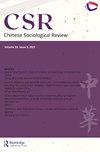Lost in transition: the two structurally distinct groups of drug addicts in contemporary China
IF 1.4
2区 社会学
Q2 SOCIOLOGY
引用次数: 0
Abstract
Abstract Despite of persistent anti-drug regulations and policies, China has encountered a large boom in narcotic drug addicts. Drug addicts can be found in distinct social groups, from the rich to the poor. Classic drug research theories have paid less attention to drug addiction issues in transitional China’s context. This study introduces a socio-structural transition perspective to explore the increasing and wide-spreading drug addiction problems in contemporary China. Based on in-depth interviews with drug addicts, social workers, and local policemen in Fujian, we collected 13 addict cases with detailed life experiences. Two structurally distinct groups were identified among the addicts. The impoverished descender addicts, struggling with much frustration in the disadvantaged situations, are associated with the class-based drug initiation patterns. Meanwhile, the affluent upstart addicts, gaining easy money with the traditional moral commitment left behind, are related to the consumer-based pathways to drug abuse. Moreover, these distinct addicts have commonalities in contemporary Chinese contexts. At the macro level, they fail to adapt themselves to the rapid structural transition process in both the material and spiritual ways, and thus are lost into the drug-related deviant social positions with weakening social controls and exposure to deviant peers. These findings further indicate the complex associations among deviant social consequences, social classes, and socio-structural changes in historical process.迷失在转型中:当代中国两种结构上截然不同的吸毒者群体
尽管禁毒法规和政策持续不断,但中国的毒品成瘾者数量激增。吸毒者可以在不同的社会群体中找到,从富人到穷人。传统的药物研究理论对中国转型背景下的药物成瘾问题关注较少。本研究引入社会结构转型的视角,探讨当代中国日益严重和普遍存在的吸毒问题。通过对福建吸毒人员、社会工作者和当地警察的深度访谈,我们收集了13例吸毒人员的详细生活经历。在成瘾者中发现了两个结构不同的群体。贫困的吸毒成瘾者在处于不利地位的情况下与许多挫折作斗争,与基于阶级的吸毒开始模式有关。与此同时,富裕的暴发户吸毒成瘾者轻而易举地赚到了钱,而传统的道德承诺却被抛在脑后,这与以消费者为基础的吸毒途径有关。此外,这些不同的成瘾者在当代中国语境中具有共性。在宏观层面上,他们在物质和精神上都无法适应快速的结构转型过程,从而迷失在与毒品有关的越轨社会地位中,社会控制减弱,与越轨同伴接触。这些发现进一步表明,在历史进程中,越轨社会后果与社会阶层和社会结构变化之间存在着复杂的联系。
本文章由计算机程序翻译,如有差异,请以英文原文为准。
求助全文
约1分钟内获得全文
求助全文

 求助内容:
求助内容: 应助结果提醒方式:
应助结果提醒方式:


